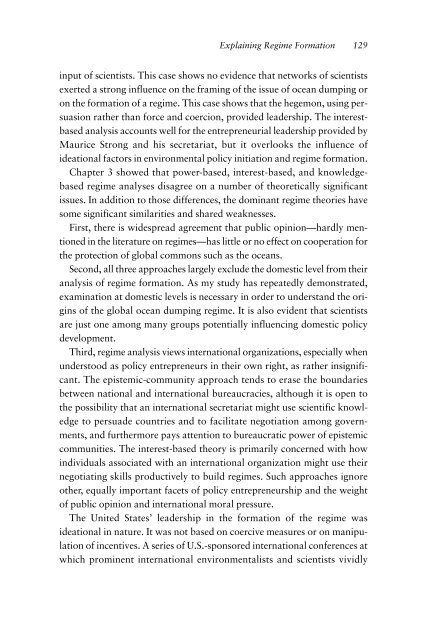Radioactive Waste Disposal at Sea: Public Ideas ... - IMO
Radioactive Waste Disposal at Sea: Public Ideas ... - IMO
Radioactive Waste Disposal at Sea: Public Ideas ... - IMO
You also want an ePaper? Increase the reach of your titles
YUMPU automatically turns print PDFs into web optimized ePapers that Google loves.
Explaining Regime Form<strong>at</strong>ion 129<br />
input of scientists. This case shows no evidence th<strong>at</strong> networks of scientists<br />
exerted a strong influence on the framing of the issue of ocean dumping or<br />
on the form<strong>at</strong>ion of a regime. This case shows th<strong>at</strong> the hegemon, using persuasion<br />
r<strong>at</strong>her than force and coercion, provided leadership. The interestbased<br />
analysis accounts well for the entrepreneurial leadership provided by<br />
Maurice Strong and his secretari<strong>at</strong>, but it overlooks the influence of<br />
ide<strong>at</strong>ional factors in environmental policy initi<strong>at</strong>ion and regime form<strong>at</strong>ion.<br />
Chapter 3 showed th<strong>at</strong> power-based, interest-based, and knowledgebased<br />
regime analyses disagree on a number of theoretically significant<br />
issues. In addition to those differences, the dominant regime theories have<br />
some significant similarities and shared weaknesses.<br />
First, there is widespread agreement th<strong>at</strong> public opinion—hardly mentioned<br />
in the liter<strong>at</strong>ure on regimes—has little or no effect on cooper<strong>at</strong>ion for<br />
the protection of global commons such as the oceans.<br />
Second, all three approaches largely exclude the domestic level from their<br />
analysis of regime form<strong>at</strong>ion. As my study has repe<strong>at</strong>edly demonstr<strong>at</strong>ed,<br />
examin<strong>at</strong>ion <strong>at</strong> domestic levels is necessary in order to understand the origins<br />
of the global ocean dumping regime. It is also evident th<strong>at</strong> scientists<br />
are just one among many groups potentially influencing domestic policy<br />
development.<br />
Third, regime analysis views intern<strong>at</strong>ional organiz<strong>at</strong>ions, especially when<br />
understood as policy entrepreneurs in their own right, as r<strong>at</strong>her insignificant.<br />
The epistemic-community approach tends to erase the boundaries<br />
between n<strong>at</strong>ional and intern<strong>at</strong>ional bureaucracies, although it is open to<br />
the possibility th<strong>at</strong> an intern<strong>at</strong>ional secretari<strong>at</strong> might use scientific knowledge<br />
to persuade countries and to facilit<strong>at</strong>e negoti<strong>at</strong>ion among governments,<br />
and furthermore pays <strong>at</strong>tention to bureaucr<strong>at</strong>ic power of epistemic<br />
communities. The interest-based theory is primarily concerned with how<br />
individuals associ<strong>at</strong>ed with an intern<strong>at</strong>ional organiz<strong>at</strong>ion might use their<br />
negoti<strong>at</strong>ing skills productively to build regimes. Such approaches ignore<br />
other, equally important facets of policy entrepreneurship and the weight<br />
of public opinion and intern<strong>at</strong>ional moral pressure.<br />
The United St<strong>at</strong>es’ leadership in the form<strong>at</strong>ion of the regime was<br />
ide<strong>at</strong>ional in n<strong>at</strong>ure. It was not based on coercive measures or on manipul<strong>at</strong>ion<br />
of incentives. A series of U.S.-sponsored intern<strong>at</strong>ional conferences <strong>at</strong><br />
which prominent intern<strong>at</strong>ional environmentalists and scientists vividly

















